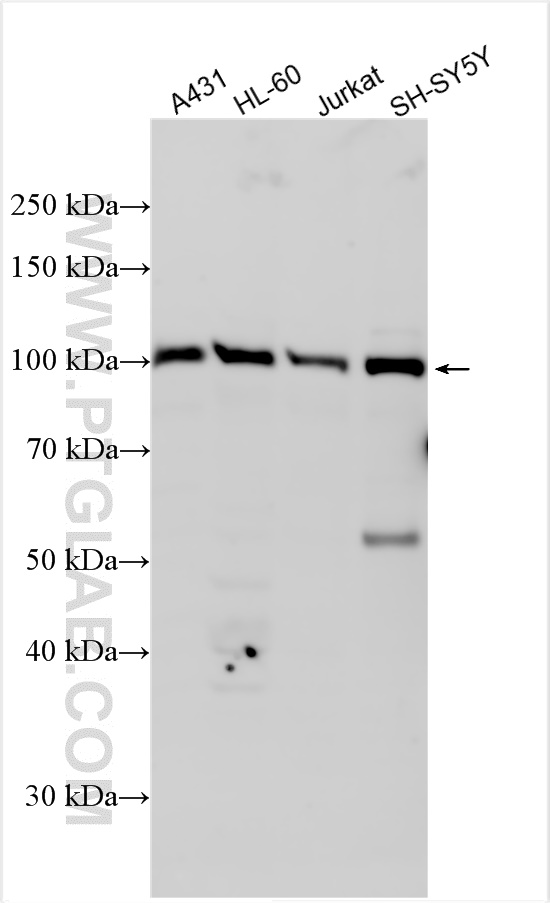验证数据展示
经过测试的应用
| Positive WB detected in | A431 cells, HL-60 cells, Jurkat cells, SH-SY5Y cells |
推荐稀释比
| 应用 | 推荐稀释比 |
|---|---|
| Western Blot (WB) | WB : 1:500-1:3000 |
| It is recommended that this reagent should be titrated in each testing system to obtain optimal results. | |
| Sample-dependent, Check data in validation data gallery. | |
产品信息
31841-1-AP targets FAAP100 in WB, ELISA applications and shows reactivity with human samples.
| 经测试应用 | WB, ELISA Application Description |
| 经测试反应性 | human |
| 免疫原 | FAAP100 fusion protein Ag36385 种属同源性预测 |
| 宿主/亚型 | Rabbit / IgG |
| 抗体类别 | Polyclonal |
| 产品类型 | Antibody |
| 全称 | chromosome 17 open reading frame 70 |
| 别名 | FLJ22175, Fanconi anemia-associated protein of 100 kDa, Fanconi anemia core complex-associated protein 100, C17orf70 |
| 计算分子量 | 93 kDa |
| 观测分子量 | 100 kDa |
| GenBank蛋白编号 | BC117139 |
| 基因名称 | C17orf70 |
| Gene ID (NCBI) | 80233 |
| RRID | AB_3670125 |
| 偶联类型 | Unconjugated |
| 形式 | Liquid |
| 纯化方式 | Antigen affinity Purification |
| UNIPROT ID | Q0VG06 |
| 储存缓冲液 | PBS with 0.02% sodium azide and 50% glycerol , pH 7.3 |
| 储存条件 | Store at -20°C. Stable for one year after shipment. Aliquoting is unnecessary for -20oC storage. |
背景介绍
FA core complex associated protein 100 (FAAP100, also known as C17orf70) is a component of the Fanconi anemia (FA), which plays a role in the FA-associated DNA damage response network as well as regulates Fanconi anemia group D2 protein (FANCD2) monoubiquitination and the stability of the FA core complex (PMID: 17396147). FAAP100 deletion leads to FA pathway inactivation, increases TRCs and cotranscriptional R-loops, and contributes to the collapse of replication forks and the generation of DNA damage (PMID: 37580696).
实验方案
| Product Specific Protocols | |
|---|---|
| WB protocol for FAAP100 antibody 31841-1-AP | Download protocol |
| Standard Protocols | |
|---|---|
| Click here to view our Standard Protocols |
